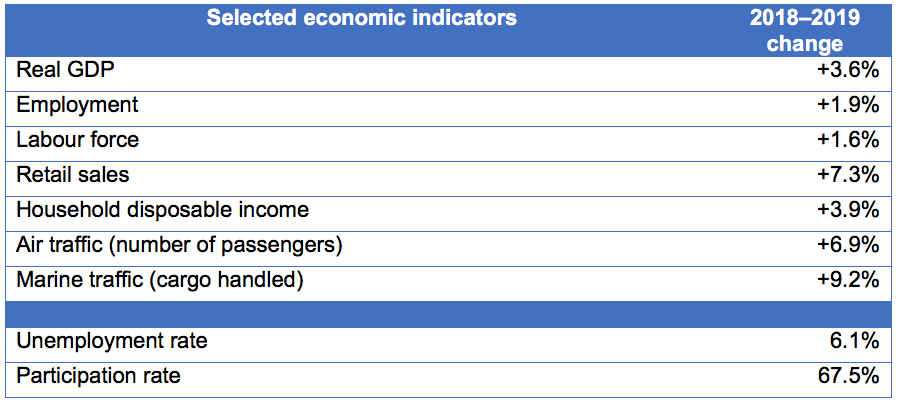Greater Montréal leads the pack for economic growth in Canada
Greater Montréal has had an exceptional 2018 as it maintained its economic momentum from 2017
With a real growth of 3.6% in its GDP, Greater Montréal’s economy achieved one of its best results in 20 years. The city recorded the highest economic growth among major Canadian cities, ahead of Toronto, Vancouver, Calgary and Ottawa-Gatineau.
The job market is also doing very well with the labour force participation rate up to 67.5%, a net gain of 41,000 jobs (+1.9%) and an unemployment rate that is dropping year after year. In 2018, Montréal had its lowest unemployment rates in history—6.1%.[1]
Retail sales experienced the largest annual hike among major Canadian cities with a growth of 7.3%. The Greater Montréal economy is running at full steam with robust consumption and positive economic indicators.

Source: Conference Board du Canada, Institut de la statistique du Québec, Port de Montréal et Aéroports de Montréal
International factor and leading-edge technologies play key role
One reason the economy is doing so well is that foreign investment and talent have been pouring in from abroad like never before.
The number of international students has risen by over 6% in 2018 and air and marine traffic have had respective growth of 6.9% and 9.2%.
What’s more, in 2018, Montréal International (MI) helped a record number of businesses and foreign workers settle in Montréal. Most of them chose to invest or work in the city’s high-tech sectors, such as AI, video games, visual effects, aerospace, fintech and life sciences and health technologies.
In only two years, MI facilitated over thirty AI projects, for investments totalling $500 million. The companies that have invested in the region in 2018 include Behavox, MegaZebra, QuantumBlack, Scanline VFX, Upgrade and Varian Medical System.
In conclusion, the city has once again been Québec’s economic driver. The success in attracting foreign direct investment and international talent coupled with the growing economic activity in leading-edge sectors have enabled the region to sustain its economic vitality and create high-quality jobs. Maintaining this strategy of being open to the world will be crucial to Greater Montréal’s future successes.
[1] The Conference Board of Canada started publishing data on the unemployment rate of metropolitan areas in 1987.






